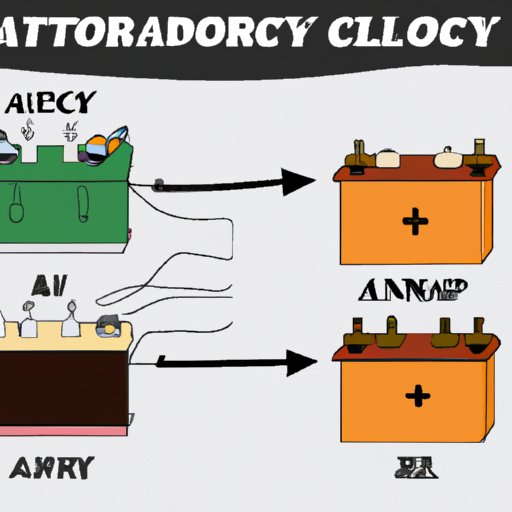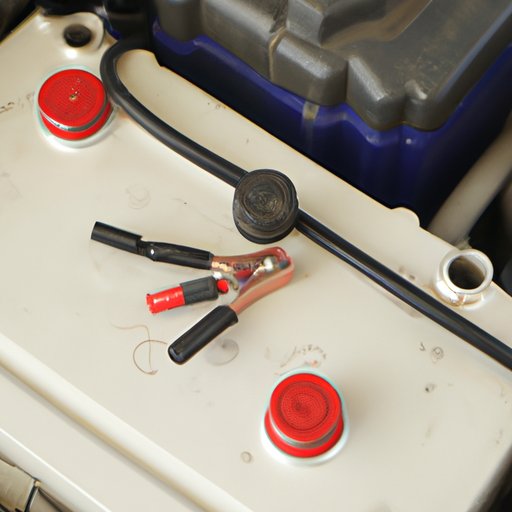Introduction
Your car battery is an essential part of your vehicle. It provides the power to start your engine and keep it running. But how often does a car battery need to be replaced? This article will provide a comprehensive overview of car battery life expectancy, when it needs to be replaced, and what you need to know about replacing your car battery.
The Lifespan of a Car Battery: How Often Does It Need to be Replaced?
The lifespan of a car battery varies depending on a few factors. These include the type of battery, the climate in which it is used, and how frequently you use it. Generally speaking, most car batteries last between three to five years. In hotter climates, however, the life expectancy can be shorter due to the increased heat and strain on the battery.
When should you replace your car battery? If your battery is more than three years old, it’s important to have it tested regularly. If it’s showing signs of wear or if it’s not holding a charge, then it’s probably time to replace it.
What You Need to Know About Replacing Your Car Battery
There are several types of car batteries available, including lead-acid, lithium-ion, and nickel-metal hydride. Each type has its own advantages and disadvantages, so it’s important to do your research before choosing one. The cost of replacement also varies depending on the type of battery and the make and model of your car.
Replacing your car battery can be done either professionally or by yourself. Professional installation usually costs more but ensures that the job is done correctly and safely. If you choose to do it yourself, make sure you understand the process and have all the necessary tools and equipment.

Car Battery Maintenance: When and How to Replace It
Regular maintenance checks are important for prolonging the life of your car battery. This includes cleaning the battery terminals and checking the fluid levels. It’s also important to keep the battery charged, as this helps prevent sulfation, a buildup of lead sulfate crystals on the battery plates that can reduce its performance and shorten its lifespan.
If you experience any problems with your car battery, it’s important to troubleshoot them as soon as possible. Common problems include corrosion, loose connections, and low fluid levels. If you’re unable to resolve the issue yourself, it’s best to take it to a professional for further inspection and repair.

Understanding the Lifecycle of a Car Battery
A car battery goes through a number of stages during its lifecycle. These include the initial charging stage, where the battery is first filled with electricity; the discharge stage, where the battery is used to power the car; and the recharging stage, where the battery is refilled with electricity. As the battery ages, it gradually loses its ability to hold a charge and will eventually need to be replaced.
Knowing when to replace your car battery is important. There are several warning signs that indicate it’s time to get a new one. These include dim headlights, slow engine crank, swelling or bulging case, and corroded terminals.
4 Signs That Indicate it’s Time to Replace Your Car Battery
1. Dim lights – If your headlights are dimming or flickering, it could be a sign that your battery is failing.
2. Slow engine crank – If it takes longer than usual for your engine to start up, it could be a sign that your battery is weak or failing.
3. Swelling or bulging case – If the casing of your battery is bulging or swollen, this is a sign that it’s no longer able to hold a charge and should be replaced.
4. Corroded terminals – If the terminals of your battery are corroded, it could mean that the battery is leaking acid. This is a sign that the battery should be replaced as soon as possible.
Conclusion
In conclusion, how often does a car battery need to be replaced? The answer depends on a variety of factors, including the type of battery, the climate in which it is used, and how frequently you use it. On average, most car batteries last between three to five years. To extend the life of your car battery, regular maintenance checks and troubleshooting of any problems are recommended. If your car battery is more than three years old, it’s important to have it tested regularly and look out for warning signs that indicate it’s time to replace it.
(Note: Is this article not meeting your expectations? Do you have knowledge or insights to share? Unlock new opportunities and expand your reach by joining our authors team. Click Registration to join us and share your expertise with our readers.)
